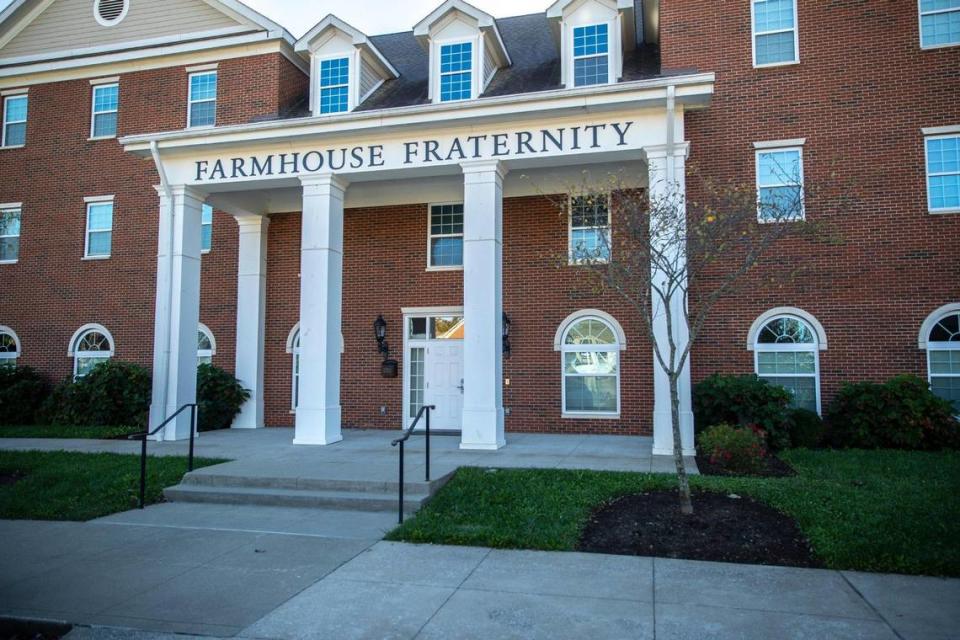UK fraternity death: What we know about how the university investigations will unfold.
Two investigations are underway after a student was found unresponsive at the FarmHouse fraternity house at the University of Kentucky and later died, likely from alcohol toxicity.
UK investigates incidents involving student organizations when the Office of Student Conduct receives notice that a campus policy may have been broken. Serving, selling or using alcohol is generally not allowed on campus, according to UK’s administrative policies.
In addition to the Office of Student Conduct, the death of Thomas “Lofton” Hazelwood is also being investigated by UK Police, according to a message from President Eli Capilouto and Vice President for Student Success Kirsten Turner sent earlier this week.
In the same message, Capilouto and Turner said they were committed to finding out what led to Hazelwood’s death.
“We have conveyed to Lofton’s family that we will move as quickly as possible, but also transparently and comprehensively,” they said. “We won’t speculate or engage in conjecture, but we will find out.”
Here are UK’s policies on alcohol use, as well as the investigation process for when the policy is broken by a student organization, and the possible consequences.
What led to the current investigations at UK?
On Monday, Hazelwood was found unresponsive at the FarmHouse Fraternity at UK. He was taken to UK Hospital, where attempts to revive him were unsuccessful. Hazelwood was 18, an agricultural economics student and a new member of the fraternity. He likely died of alcohol poisoning, said Fayette County Coroner Gary Ginn.
What other steps has UK taken so far?
UK has suspended “all activities for the FarmHouse Fraternity” while the two investigations are conducted. The university has also suspended all pledge activities for fraternities on campus and is requiring training on bystander intervention and hazing prevention for all fraternity members.
What is UK’s policy for alcohol on campus?
Serving, selling or using alcohol on campus is not allowed, except under certain circumstances, according to UK’s administrative policies.
In some cases, alcohol can be served or sold at events, like private events where the majority of attendees are over the age of 21 or alumni events, but only with permission from UK.
If a registered student organization gets permission to serve or sell alcohol at an event, the organization still has to comply with state and local laws, as well as university policies. Attendees under the age of 21 are not allowed to be served alcohol in these cases, according to the policy.
Beyond university policies, many Greek organizations have their own policies that “prohibit when and where students can drink,” said Trisha Clement Montgomery, dean of students. In 1998, UK banned alcohol from all fraternity and sorority houses. FarmHouse was one of the first fraternities to ban alcohol, according to Herald-Leader archives.
“If a student is reported to the office of student conduct as violating this policy, they are subject to a number of sanctions and restorative actions,” Clement Montgomery said in an email.
UK Police found alcohol and filed a liquor law violation for the FarmHouse Fraternity on Monday, according to the campus police crime log. The violation was “person aged 18-20 in possession of alcohol (20 counts); alcohol intoxication.”
UK also has a policy that prohibits hazing. It is not currently known if Hazelwood’s death was connected to hazing, UK spokesperson Jay Blanton said.
How does an investigation begin?
After a student organization has been reported to the Office of Student Conduct for potentially violating a policy, a letter is sent to the head of the organization outlining the allegation. In the case of a fraternity violating a policy, a letter is sent to the chapter president, Clement Montgomery said.
“It is important to note that we facilitate an investigation with no bias or determination that the fraternity has violated until the investigation is complete,” Clement Montgomery said.
The chapter president is asked to respond to the allegation before a deadline. The letter can also include interim actions, which are to be upheld by the fraternity during the investigation, Clement Montgomery said.
How are student organizations investigated?
Investigations can vary based on the incident that has been reported to the Office of Student Conduct, Clement Montgomery said.
In general, after an organization has been notified of the allegation and given a deadline to respond, the office begins identifying individuals who have knowledge of the incident and scheduling interviews with them as soon as possible. While those meetings are ongoing, additional evidence, like photos, documents and schedules are also gathered.
The office then creates an investigative report, from which charges for individuals or organizations can occur. Charges are handed out based on the Code of Student Conduct, she said.
Additionally, police can investigate an incident at the same time the university does, she said.
“The Office of Student Conduct process does not dictate or impede a criminal investigation, and those two processes take place independently,” she said.
What consequences could a student group face?
Depending on the results of the investigation, consequences can range from an informal or written warning to suspension or expulsion for individuals, according to UK’s Code of Student Conduct. Student organizations can lose their status as a registered student organization.
If a sorority or fraternity house is found to be violating the alcohol policy, UK could terminate the lease with the organization, according to the policy.
In the past, fraternities at UK have been suspended for various violations. In 2020, Sigma Alpha Epsilon was suspended for two years after the fraternity was found to have violated university COVID-19 guidelines and after underage people were found to have alcohol at the fraternity’s house. As part of the suspension, the fraternity could not have any official meetings or events, or use its on-campus house.


